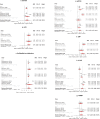Gut dysbiosis in severe mental illness and chronic fatigue: a novel trans-diagnostic construct? A systematic review and meta-analysis
- PMID: 33558650
- PMCID: PMC8960409
- DOI: 10.1038/s41380-021-01032-1
Gut dysbiosis in severe mental illness and chronic fatigue: a novel trans-diagnostic construct? A systematic review and meta-analysis
Abstract
Reduced gut-microbial diversity ("gut dysbiosis") has been associated with an anhedonic/amotivational syndrome ("sickness behavior") that manifests across severe mental disorders and represent the key clinical feature of chronic fatigue. In this systematic review and meta-analysis, we investigated differences in proxy biomarkers of gut dysbiosis in patients with severe mental illness and chronic fatigue vs. controls and the association of these biomarkers with sickness behavior across diagnostic categories. Following PRISMA guidelines, we searched from inception to April 2020 for all the studies investigating proxy biomarkers of gut dysbiosis in patients with severe mental illness and chronic fatigue. Data were independently extracted by multiple observers, and a random-mixed model was used for the analysis. Heterogeneity was assessed with the I2 index. Thirty-three studies were included in the systematic review; nineteen in the meta-analysis (N = 2758 patients and N = 1847 healthy controls). When compared to controls, patients showed increased levels of zonulin (four studies reporting data on bipolar disorder and depression, SMD = 0.97; 95% Cl = 0.10-1.85; P = 0.03, I2 = 86.61%), lipopolysaccharide (two studies reporting data on chronic fatigue and depression, SMD = 0.77; 95% Cl = 0.42-1.12; P < 0.01; I2 = 0%), antibodies against endotoxin (seven studies reporting data on bipolar disorder, depression, schizophrenia, and chronic fatigue, SMD = 0.99; 95% CI = 0.27-1.70; P < 0.01, I2 = 97.14%), sCD14 (six studies reporting data on bipolar disorder, depression, schizophrenia, and chronic fatigue, SMD = 0.54; 95% Cl 0.16-0.81; P < 0.01, I2 = 90.68%), LBP (LBP, two studies reporting data on chronic fatigue and depression, SMD = 0.87; 95% Cl = 0.25-1.48; P < 0.01; I2 = 56.80%), alpha-1-antitripsin (six studies reporting data on bipolar disorder, depression, and schizophrenia, SMD = 1.23; 95% Cl = 0.57-1.88; P < 0.01, I2: 89.25%). Elevated levels of gut dysbiosis markers positively correlated with severity of sickness behavior in patients with severe mental illness and chronic fatigue. Our findings suggest that gut dysbiosis may underlie symptoms of sickness behavior across traditional diagnostic boundaries. Future investigations should validate these findings comparing the performances of the trans-diagnostic vs. categorical approach. This will facilitate treatment breakthrough in an area of unmet clinical need.
© 2021. The Author(s).
Conflict of interest statement
The authors declare that they have no conflict of interest.
Figures


References
Publication types
MeSH terms
Substances
LinkOut - more resources
Full Text Sources
Other Literature Sources
Medical
Miscellaneous

